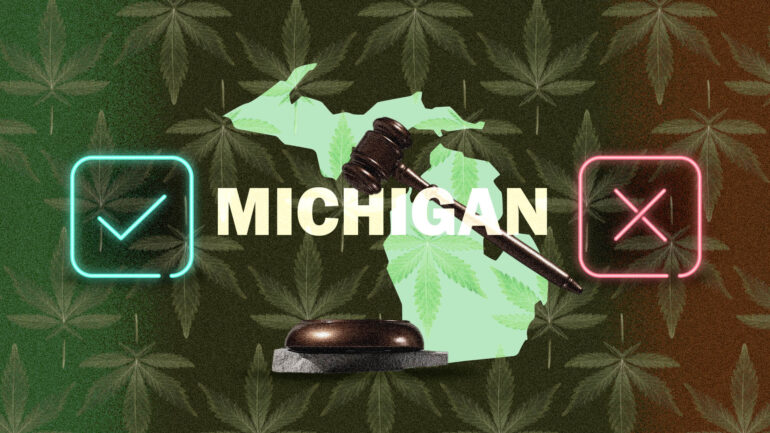Key Takeaways
- Any adult aged 21 or over can possess up to 2.5 ounces of cannabis at any time and up to 10 ounces at home, as well as cultivating up to 12 plants.
- Medical marijuana is also legal in Michigan, with a possession limit of 2.5 ounces or the equivalent in infused products for qualifying patients.
- Even if you possess more than the allowed amount, punishments for excess possession are generally limited to fines, with jail time only in extreme situations.
Weed is legal in Michigan, both for medical and recreational use.
As in most states, the Michigan recreational weed laws stipulate that the person must be over 21 to buy and possess cannabis. There is a “physical” possession limit of 2.5 ounces, but you can have 10 ounces if it’s locked away at home, and you can grow up to 12 plants at home.
However, there is more to the issue than “is weed legal in Michigan?” and it’s a good idea to learn about things like public use and drug driving laws before lighting up in the state.
Michigan Cannabis Laws
Weed is legal in Michigan for adults aged 21 and over, and also medically. You can possess up to 2.5 ounces (10 ounces at home) and grow up to 12 plants.
Recreational Cannabis Laws
Michigan weed legalization happened through the Michigan Regulation and Taxation of Marihuana Act, which passed the public ballot in November 2018.
As with many recreational weed laws, weed is only legal for people aged 21 and over, and the only places to legally buy are state-approved dispensaries.
The weed possession limit in Michigan is 2.5 ounces (70.87 g), including up to 15 g of concentrate, with an increase to 10 ounces within your own home.
This basically means you can have up to 2.5 ounces on you at any time, you can buy 2.5 ounces from a dispensary in a single day, and this is also the maximum amount you can give away (or just transfer without payment) to another adult legally. In addition, you can grow up to 12 plants and have any additional marijuana harvested from them in your home.
Note: You may have noticed the “h” in the spelling of marihuana in Michigan law. This is basically 100-year-old racism: the federal government spelled it that way to make it sound more Mexican.
Penalties for Excess Possession
Although you can possess up to 10 ounces of marijuana in your home legally and 2.5 ounces out of the house, if you have more weed than this, then there are punishments.
- If you have more than the allowed amount but not more than double it (e.g. up to 5 ounces on your person or between 12 and 24 plants), then a first violation is considered a civil infraction and punished by a fine of up to $500 and they’ll take the weed.
- A second violation under the same limits doubles the maximum fine, and a third violation raises the fine to a maximum of $2,000.
- If you possess more than double an allowed amount (e.g. over 5 ounces or over 24 plants), then it’s considered a misdemeanor, with the same fine structure but only jail time if “the violation was habitual, willful, and for a commercial purpose or the violation involved violence.”
Medical Marijuana Laws
You can also be prescribed marijuana medically in Michigan.
The Michigan medical marijuana laws state that any qualifying patient in possession of a registry identification card (i.e. a Michigan weed card) can use marijuana medically.
Patients in the medical marijuana program have to be at least 18 years old, and as in most states, you have to have one of the qualifying “debilitating medical conditions” to qualify.
Medical Marijuana Patient Possession Limits
There are possession limits under Michigan’s medical marijuana laws, and these generally match those for recreational users.
However, the law actually states 2.5 ounces or “usable marijuana equivalents,” which it also defines.
An ounce of marijuana is equivalent to:
- 16 ounces of an infused product in solid form
- 7 grams of a marijuana-infused gas
- 36 fluid ounces of a marijuana infused liquid
This means you can possess either 2.5 ounces of flower, 40 ounces of edibles (solid infused products), 17.5 grams of infused gas, and 90 fluid ounces of infused liquid.
You can also mix and match these amounts provided the combined total is 2.5 ounces equivalent.
How to Get a Medical Marijuana Card in Michigan?
You get a Michigan medical marijuana card by going to your physician and getting a diagnosis of one of the qualifying conditions.
If you have one and your physician agrees, he or she will give you a written certification, which you need to include with your application.
The qualifying conditions are listed on the Michigan Cannabis Regulatory Agency’s website:
- Cancer
- Glaucoma
- HIV Positive
- AIDS
- Hepatitis C
- Amyotrophic Lateral Sclerosis
- Crohn’s Disease
- Agitation of Alzheimer’s Disease
- Nail Patella
- Post – Traumatic Stress Disorder
- Obsessive Compulsive Disorder
- Arthritis
- Rheumatoid Arthritis
- Spinal Cord Injury
- Colitis
- Inflammatory Bowel Disease
- Ulcerative Colitis
- Parkinson’s Disease
- Tourette’s Disease
- Autism
- Chronic Pain
- Cerebral Palsy
- Any conditions, medications or combinations of which that produce at least one of:
- Cachexia or Wasting Syndrome
- Severe and Chronic Pain
- Severe Nausea
- Seizures (Including but not limited to those characteristic of epilepsy)
- Severe and Persistent Muscle Spasms (Including but not limited to those characteristic of multiple sclerosis)
When you have the certification from a qualified physician, you can submit the application alongside it and proof of Michigan residency. You’ll also have to pay a $40 fee for the application, and there is no additional fee for registering a caregiver. Your registry ID card is the only thing that identifies you as an official medical marijuana patient.
Michigan also offers reciprocity, so if you’re a certified out-of-state patient, you can buy weed from medical dispensaries in the state with a valid patient ID and matching photo ID.
Public Consumption Laws
Despite Michigan’s weed legalization, you’re still not allowed to consume marijuana in public.
Essentially, you’re only allowed to consume marijuana in private property with the permission of the owner, and you’re never allowed to consume in public places or on public property such as schools, hospitals, parks or bars. If you break this rule, it’s considered a civil infraction, punishable by a fine of up to $100.
If you use on federal property, it’s a misdemeanor (since you’re under federal law), and it’s punishable by a fine of up to $1,000 and a maximum of 1 year in jail.
Can You Drive Under the Influence of Marijuana?
As in every state in the country, you can’t drive under the influence of marijuana in Michigan.
In theory, Michigan has a zero tolerance law for driving under the influence of drugs, with any amount of a Schedule I substance in your body being outlawed while driving.
However, there are exceptions for inert metabolites of marijuana and for people with medical marijuana cards. If you’re a medical patient, the state instead has to show that you’re impaired in order to convict.
The punishments for a DUI in Michigan are as follows:
- For a first offense, it’s a misdemeanor punished by one or more of: up to 360 hours community service, up to 93 days imprisonment and a fine of between $100 and $500.
- For a second offense (within 7 years), you receive a fine of between $200 and $1,000 and between 5 days to a year in jail and/or 30 to 90 days’ community service.
- For a third offense (regardless of time elapsed), it’s a felony, punishable by: a fine of $500 to $5,000 and either imprisonment by the Department of Corrections for between 1 and 5 years or probation with imprisonment in the county jail for between 30 days and 1 year (at least 48 hours consecutive), and community service for between 60 and 180 days.
Delta-8 THC Laws
Delta-8 THC is restricted in Michigan.
Despite HB 4744 legalizing hemp in line with the federal Farm Bill, following the rise of concern around delta-8 starting in 2020 and their legalization of cannabis, lawmakers made some changes.
A collection of bills (especially HB 4517) basically made it so that delta-8 is clearly included in the state’s definition of cannabis.
In short, delta-8 THC is legal in Michigan, but sellers would have to go through the same process as other legal cannabis products.
Is Weed Decriminalized in Michigan?
Weed is legal in Michigan so decriminalization isn’t really necessary – it’s basically already happened for amounts beyond the legal limits. Possessing less than 2.5 ounces is outright legal, with no punishment whatsoever.
Is Growing Weed Legal?
You can grow weed in Michigan under both the recreational and medicinal cannabis laws.
In both cases, there is a limit of 12 plants. The only real rules around this basically describe where you’re allowed to grow.
In particular, the location where you grow your marijuana cannot be visible from a public place without the use of optical aids, and it has to be locked or have other security measures to restrict access to the grow area.
Conclusion
Michigan’s recreational weed laws are permissive and reasonable, with a high possession limit with an even larger in-house limit, and relaxed rules around cultivation too.
The medical marijuana program has the same 2.5 ounce and 12 plant limit, but you need to be certified by a qualified physician and have a pre-approved condition in order to qualify. With all of this considered, it’s one of the best states in the country for cannabis consumers.

